
In 2016, Austin businesses continued to thrive while the city earned national recognition again as a top city in the country for startup vitality. Artificial intelligence, machine learning, IoT and virtual reality companies gained momentum last year alongside the usual Austin staples in software and healthtech.
scaleWe've carefully selected 50 local startups — all less than five years old — that have been generating buzz. Some are in their infancy while others have already experienced significant user growth, but you'll want to keep an eye out for them in 2017.

Aceable has helped over 300,000 students pass their driver’s ed certification course through the startup’s online program. Following a $4 million Series A round last September, the company plans to extend their online courses to additional industries requiring professional certification, including real estate, corporate HR, nursing and food safety. Their driver’s ed app is one of the highest grossing education apps in both Google Play and the App Store.

Alert Media helps large companies and organizations maintain employee safety through its communication and monitoring software. Founded in 2013, the company offers a two-way notification platform to keep employees informed and connected when urgent messages arise. The company closed a $4 million funding round in April to continue developing products for enterprise customers, bringing its total funding to $9 million since launch.

Ojo Labs locked in $5.8 million at the start of last year, but we didn’t know much else at the time. Founded by John Berkowitz, co-founder of Yodle, and David Rubin, founder and former CEO of ProfitFuel, we can surmise the startup offers a conversation-learning bot system, giving businesses the ability to interact with humans at scale. The platform remains in beta as the team works to perfect it.

Ben Rubenstein, the man responsible for growing Yodle from a startup to 1,500 employees, launched Opcity in 2015. Returning to his startup roots, the small team at Opcity delivers pre-screened live sales leads to real estate agents and mortgage loan officers. Only agents identified as a good fit for the client receive leads.

RigUp’s online marketplace for bidding, invoicing and compliance of oilfield services earned them a $15 million Series A in April last year. Allowing operators and service companies to operate more environmentally friendly and efficiently, RigUp’s solutions were built by a team of former Google, RetailMeNot, IBM and energy veterans.

Fresh off of a year spent growing their customer base from 10 to 7,000 users, Self Lender builds tools to help people increase their credit score and save money at the same time. One user said they went from a credit score of 0 to over 600 in a 90-day period through the startup’s loan system. Experiencing their most rapid customer growth in the last quarter, the startup is on pace for huge 2017.

In a world full of human hacker efforts, SparkCognition is using machine learning and artificial intelligence to learn hacker behaviors, monitor against them and identify new potential threats in order to warn against attacks before they occur. In April, SparkCognition closed a $6 million round of funding to grow its cybersecurity software customer base. They also released the first-of-its-kind, cognitive anti-virus solution called DeepArmor last summer.

Hot off two financing rounds in December totaling more than $9 million, it appears Isocline Engineering Corps is gearing up for huge 2017. Launched in Austin in 2012, the IoT startup designs cost-effective AI technology that connects to products of various sizes with low battery output. They’re currently expanding their local team and sister office in California.

Digital Pharmacist kicked off 2016 with a business direction overhaul following a $5.45 million Series A round. Since the makeover, the digital pharmacy startup has partnered with over 1,400 pharmacy brands, doubled the size of its team and is looking for a bigger office space — and more funding — in the upcoming year.

One way to predict a startup’s growth is to see how quickly they are hiring. ListingSpark, an online real estate brokerage system, has been adding new roles over the course of 2016 and also plans to expand outside of Texas this year. Their platform helps people sell their homes without recruiting (and paying for) the assistance of a real estate agent. To date, over $150 million worth of homes have been sold through the platform.

In September 2016, Liveoak Technologies beat out 800 fintech startups to win a contract with the Barclays Accelerator program in affiliation with Techstars. The Austin-based company provides an enterprise workflow software platform that maintains a human element in the digital insurance and financial application processes. In March, they closed a $1.6 million round of financing.

Almost immediately after its launch, Medici closed a $24 million round of funding to support the increasing number of patients, practitioners and hospitals signing up to use its communication platform. Medici’s app provides a safe, HIPAA-compliant way for patients to consult with their doctors, therapists and veterinarians over text or video conference without a scheduled appointment or office visit. The company started onboarding users in Texas and has since expanded nationwide — with plans to go international during Q1.

ScaleFactor merges the financial expertise of CPAs and CFOs with modern-day technology. The three-year-old fintech startup combines these two elements, providing custom, cloud-based solutions that specialize in tax services, financial technology and accounting to help automate office work for growing businesses. The team, including an office cat named Floyd, is expected to grow their accounting, operations and product departments this year.

The three serial entrepreneurs behind eRelevance have previously been tied to 12 startups that have collectively generated $1.5 billion of shareholder value at the time of their exit. Now focused on eRelevance, the team produces marketing automation services for small to medium-sized businesses. Following a $4.5 million round of funding in March to expand the team, eRelevance was recognized as a Global 100 Winner by Red Herring in November.

When account executives and managers wrap up a conversation with a client, they typically have to log notes manually. To ensure no details gets lost in translation, Tenfold has built a scalable call translating tool that integrates directly with CRMs. The company originally launched a few years back as Callinize, only to rebrand in 2015 as Tenfold. They reported 400 percent growth in September of 2016. With just a few days left in 2016, they added a $2.3 million investment and are currently expanding the team.
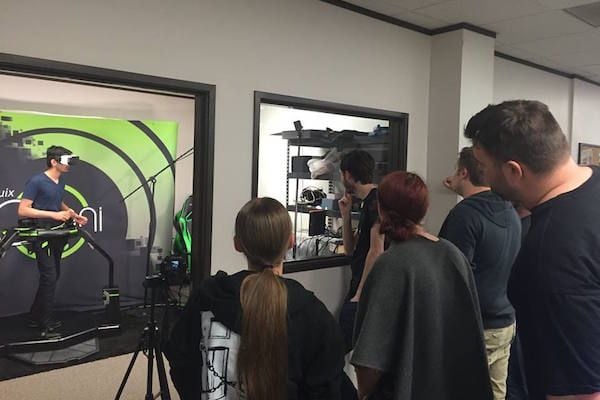
Virtuix created the first ever 360-VR gaming experience through the launch of their “Omni” platform, which allows gamers to walk and run through virtual worlds. In doing so, the company pioneered the first fully-immersive active VR gaming experience. Virtuix has raised $16 million from crowdfunding and private investors since 2013. Their team continues to swell as VR gaming soars in popularity among mega brands like Sony, HTC and Samsung.

Data.world brings data folks together on their social network to share, learn and use the world’s data in a meaningful way. The Austin company announced a partnership in November with the Anti-Defamation League to develop an open-data workspace to track and collect insights regarding frequencies of hate crimes in order to identify how current events and politics affect things. Launched in 2015 by Bazaarvoice founder Brett Hurt, they also locked in a big $14 million round of funding after bursting out of stealth mode in July 2016.

Clearhead uses continuous data, testing and personalization to change and influence consumer behavior for brands. They help businesses use data to drive UX decisions, generating and testing hypotheses to better understand and improve the digital customer experience. Since its launch in 2012, Clearhead has partnered with companies like Adidas, Whole Foods, Patagonia, CVS and Tory Burch.

OnceThere launched its platform in May, connecting consumers with travel excursions, tours and activities through a single interface. Users can book all of their experiences and pay instantly over the platform while distribution channels benefit from their services’ availability online. The company, headed by former HomeAway execs, closed a $4.4 million seed round in October.

ePatientFinder’s health platform generates clinical trial referrals based on electronic health records data, screening the patient ahead of time before sending him or her to physicians and trial sites. This screening stage yields more accurate and predictable trial data than the industry standard of ad-driven referrals. The company has raised north of $11 million, with the most recent round clocking in at $8.2 million.

What started as an idea to help one financial advisor automate the post-sale process of a life insurance policy turned into a complete software solution for the life insurance industry. InforcePro’s solutions and clientele continue to grow as they increase the number of products per customer. They’ve raised $6.5 million since inception and are poised for a big year ahead as they expand their team.

As bot systems continue to surge in popularity, one startup has created a syndication tool so that separate bots can work on multiple systems without developers having to reconfigure bots for new channels. Shortly after their initial launch, Message.io announced a $2.5 million seed round of funding and a new partnership with Microsoft. In December, they locked in another $2.9 million. The startup is in private beta right now with plans to go public during Q1 of 2017.

By connecting over 120,000 students across 170 countries, PenPal Schools creates an online learning environment for students ages nine and up to learn about other cultures and global challenges. In addition to offering high quality, engaging content to deepen students’ international understanding, the program selects three to four pen pals for every student to communicate with during a six-week period. The company won the Global Ed Tech Awards in 2016 and is on the brink of closing a seed round of funding.

Following a rebranding, Bold Metrics (formerly known as Fashion Metrics) entered two new verticals in 2016. With its human predictive measurement capabilities, Bold Metrics now supports the fashion, sports and fitness, and virtual reality sectors. Their machine learning technology uses human sizing data and answers from a brief online questionnaire to help users accurately size themselves for fitness equipment, clothing and true-to-life VR avatars.

With a small local team, Clarify builds an API system that allows businesses to search through recorded audio and video files with simple keywords, just as people would search text files. Developers can then integrate the Clarify platform into their own applications to build new and stronger services based off the info from AV libraries. Last February, they were selected to participate in Microsoft Ventures’ Machine Learning Accelerator in Seattle.
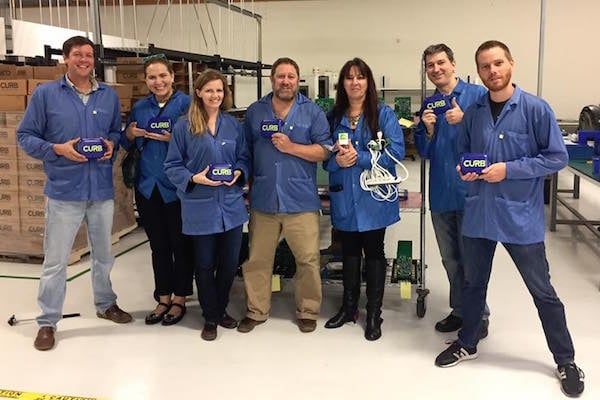
Many companies have recently launched solutions to help property and homeowners “smarten” their homes through the use of technology. In 2012, Curb began developing an intelligent home system that connects to a breaker box to monitor your home’s electricity use. Through the data it collects, Curb’s IoT solutions can identify what sources in your house use the most energy and provide real-time cost estimates. Through its app, users can learn energy saving tips while receiving electrical safety alerts.

In March 2016, two brothers launched Embark alongside a team that included a National Geographic Explorer-in-Residence, a doctor specializing in dog behavior and an engineer. Now, Embark’s clients can order an at-home testing kit to learn the breeds of their canines, genetic ancestry and even a “wolfiness score” to help with training, exercise and vet care. Embark also includes over 160 health tests to help pet owners understand certain risks for genetic diseases. The Embark team is using the doggie data to further research canine health and behavior as well as human diseases.

Jay Manickam (the co-founder of uShip), Paul Cross (the founder of Ticketbud), and Brad Dixon are the minds behind Everfest — the world’s “Festival Authority” — which aims to showcase events from all over the world. Using the platform, vendors get the chance to book more festivals and organizers can promote, find and book vendors and artists for their events. Artists can connect with organizers to get a spot in the lineup and attendees can learn about unique festivals in music, art, food and wine, film and more. Inside sources informed of us of a new product launch coming in March.

EyeQ uses technology to personalize the in-store shopping experience with interactive, digital store displays that increase sales and store loyalty. Branded, personalized messages are communicated over the screen, while it collects consumer data like age, gender and emotion. In return, the technology offers recommendations, reviews, production information and more. In May of last year, they locked in a $3.5 million round to grow their customer base.
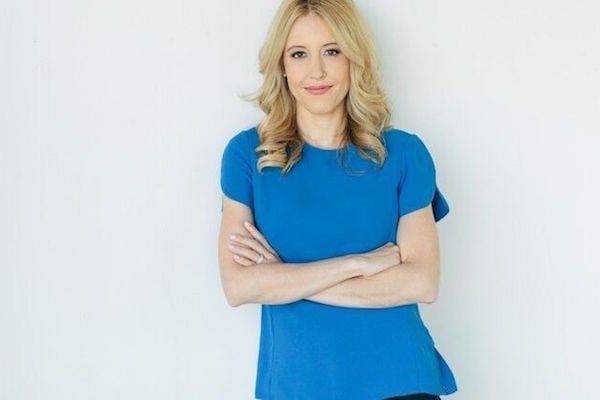
Since its inception in August 2015, EverlyWell has raised two funding rounds totaling $3 million. The company modernizes lab testing by making health tests available to consumers through online orders and front-door shipping. Board-certified physicians then review the results and publish online within days of receiving the tests.

Hangar launched in 2016 and plans to market drones to the commercial space by adding aerial data capture and analysis capabilities. Following a $6.5 million seed round of funding in October, Hangar acquired its first company, also an Austin startup, which creates software for auto-piloted drones. Since then, they’ve been hiring like crazy while adding users to their private beta.
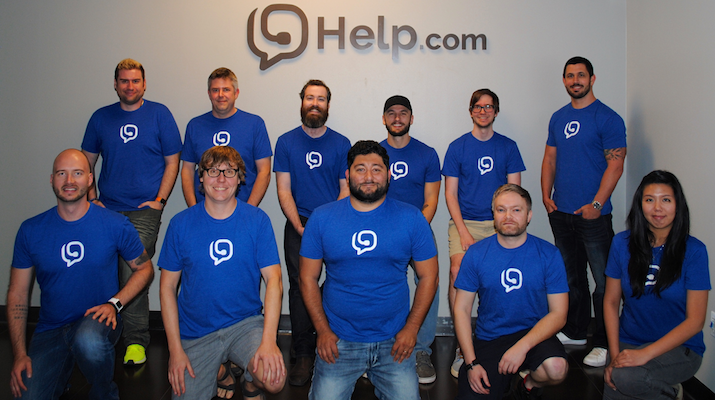
In beta right now, Help.com is staffed by a team of experienced customer service gurus and tech whizzes who have joined forces to shorten average response times for customer service software. Founded by Brent Oxley and currently led by Ben Gabler, their livechat solution provides quicker responses to customer inquiries and is compatible with third-party and proprietary platforms.

Following a friend's night in jail for driving while intoxicated, founder Alex Crosby became inspired to ensure his friends always had options to get home safely. His app HERO centralizes transportation options, including cabs, rideshares, buses and even free rides from friends who have indicated through the app that they’re available to come pick you up. The app rewards both volunteer drivers and riders for choosing safe options to get home. The team attended CES this year and told us they have lot more in store for 2017.

Hive9 designs marketing management performance tools that measure and provide insight to support CMOs, demand generation leaders and marketing ops experts. Since a funding round in June of 2015, the software company has partnered with Workfront to integrate the two marketing management platforms so customers using both can view reporting and results seamlessly.
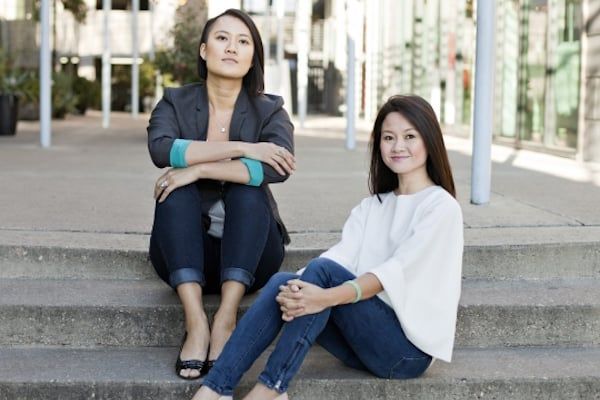
There are plenty of resources available to set your property up for a short term rental, but what about for more than 30 days? Homads is building an online marketplace for month-to-month rentals people can use to post and process property rental requests without a realtor or property management company. The idea spurs from founder Vi Nguyen’s own experiences trying to find a platform to lease her place longer than a month. Homads recently graduated in DivInc’s first pre-accelerator cohort.

Got a great app idea but don’t have the tools or knowledge to actually create it? Development firms like Keystoke offer a platform that allows for mobile app development to deploy on iOS, Windows and Android at once, as opposed to rebuilding the app for each marketplace. Keystoke builds one app for one price across all mobile operating systems, using a single code base. Since launch, they’ve gained fellow Austin startup Curb as a client.

Recently out of beta, Meretz rewards people for working out with credits for mobile games. The app links to fitness apps like Fitbit or MapMyRun and gives users virtual currency that can be used to unlock extras like additional lives and bonus levels. Currently, the company is in its second round of beta testers. Keep an eye out for the app to go live soon.

Nexd uses artificial intelligence (A.I.) as a SaaS for sales professionals. Their A.I. platform helps businesses improve sales performance and efficiencies by measuring successful sales patterns and recommending "next" actions in the sales process. To date, they’ve raised over $1 million in seed funding.

To support students in STEM courses, Querium develops an adaptive AI instructional online platform. The company closed nearly $1 million in funding since 2015 and launched its product, Stepwise — a mobile education software solution that prescribes adaptive, individualized learning paths for each student. With over three million STEM-related jobs projected to go unfilled in 2017, the Querium team hopes to lower that number.
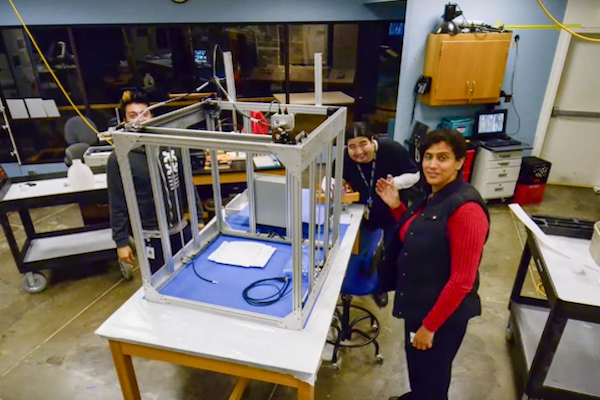
One of the biggest challenges with 3D printing right now is how to make it cost effective. Launched in 2013, Re:3D is trying to change that with its industrial, life-size 3D printer named Gigabot, which is priced below $9,000. The startup said it has decreased cost while increasing printing size by 30 times more than desktop models. This year, Re:3D will continue to scale its manufacturing operations and look into different materials and feedstocks with global leaders in material and life sciences.

The designer denim rental startup Redenim wrapped up its 12-week stint at DivInc’s pre-accelerator program in December. Consumers across the country can pay $29 per month for a subscription service to rotate high-end pairs of jeans throughout their wardrobe. At the end of three months with a pair, users can decide to purchase the pair for a subsidized amount or send them back to get a new pair. They are currently the only rental company offering designer denim in the US and have plans to seek investor funding in 2017.

SchooLinks wants to help increase the number of students going to college (and staying in college through graduation) by providing them with a matching system, similar to a dating app. The app generates suggestions based on questions like location preference, potential majors, school rankings and personal interests. It also connects students directly with admissions teams from any matched schools and offers a planning tool so students don’t miss deadlines during the application process.

As the health industry adopts new data systems for patient care while abandoning old techniques like faxing, one startup has stayed ahead of the curve to help bridge the gap between the old and the new. SocialCare, founded in 2012, currently partners with regional health professionals and has plans to go national during the first quarter.

Student Loan Genius offers student loan benefits to employers, helping save an average of $3,000 on loan payments per year per employee. Through their platform, employees can explore the best repayment options available for them while employers can offer matching contribution benefits. Last February, the company closed a $3 million round of funding. Now partnering with over 50 clients, such as Boeing, Prudential and local companies like Trendkite and BP3, Student Loan Genius is on pace for another huge year.

Music lovers saw a new way to experience live music with the beta launch of TheWaveVR last year. The startup provides musicians and fans an online platform to share, view, host and socialize their music anywhere in the world, at any time. In August, the company gained $2.5 million in investor backing, which they celebrated by hosting a “silent” VR rave in LA. While currently focusing on EDM-based musical VR experiences, the company’s founders hope it becomes a platform for friends to host live jam sessions and meet other music fans across the globe.

Trago’s patent-pending water bottle hit the IoT market after the company launched in 2015. Its technology tracks how much you drink in a day and allows users to set and measure daily hydration goals. Smart water bottle caps connect with a mobile app to keep you accurately informed within half an ounce of consumption. In 2017, the company will roll out Trago Boosts, which will include clean-label hydration mixes that also interact with the app.

After six months in stealth mode, online art dealer Twyla launched in October — hand-in-hand with a $19 million financing round. HomeAway’s former CEO Brian Sharples co-founded the platform to help make buying international, gallery-featured art pieces cheaper and easier to purchase. The website features limited-edition prints from about 80 artists, specially curated by Twyla’s art team.

Founded by CEO Jean Anne Booth in 2013, UnaliWear is set to go to market in early 2017 with its Kanega smart watch. Throughout 2016, Booth and her team raised two rounds of funding ($3.4 million in February and $2.1 million in October) to help support their 600-user market test. The Kanega watch connects to a cellular network, resembles a standard wrist watch, and learns the wearer’s speech and lifestyle to detect distress or medical problems.

If you’ve ever shopped on sites like Alibaba, then you’ve seen how much you can save if you buy in bulk. The problem is that most consumers aren’t normally looking for 25 new TVs. WholeSplit wants to make that pricing available by crowdsourcing interested buyers for the same product to secure a bulk order. When enough people sign on to buy, WholeSplit processes the order and ships units individually. The startup launched within the last six months and is quickly growing its user base and product catalog.

Zengistics launched its shipping logistics platform in 2015 to help field professionals locate their freight at all times. Users receive real-time feedback and updates to freight routes and have 24/7 access to personalized customer support. Within a year of launch, the company grew from four employees to 35 while increasing revenue from $23,000 a month to about $1 million a month.



